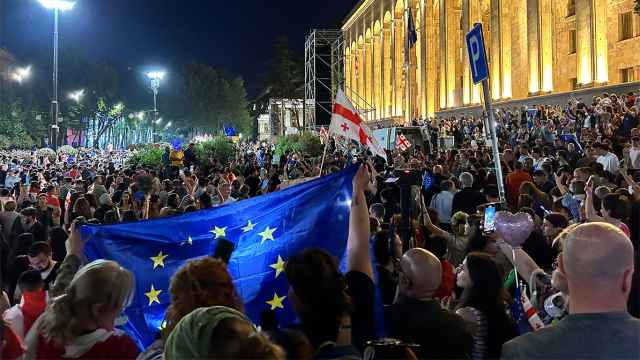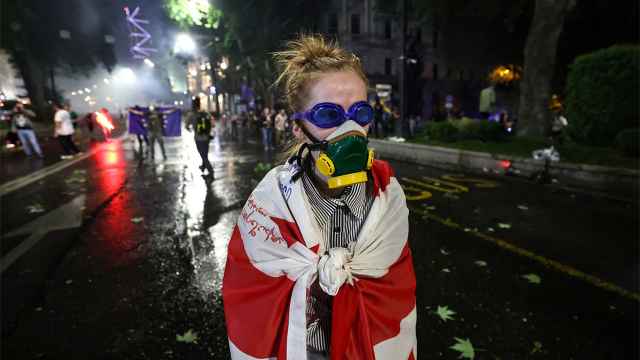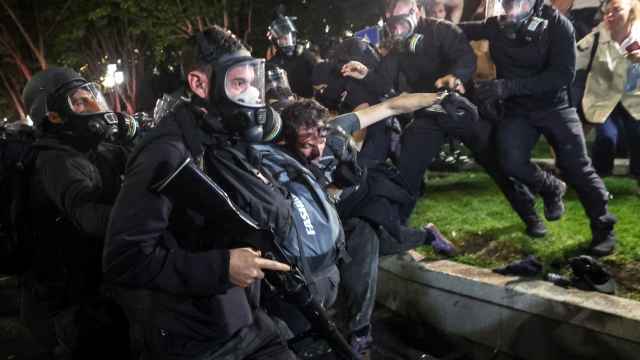Mass protests in Georgia following the government’s reintroduction of a Russia-style “foreign influence” bill are making global headlines.
A similar bill introduced last year had proposed requiring organizations to register as “foreign agents,” echoing Russian legislation that has forced the closure of independent news outlets and civil society groups. The new bill’s language has been changed to target entities working as “agents of foreign influence” rather than those acting as “foreign agents.”
Like many others working in Georgia’s civil society sector, I believe this change is mere propaganda by the ruling Georgian Dream party, which seeks to hide the fact that its bill is ultimately inspired by repressive laws in Russia.
That said, observers often narrowly focus on the draft bill while overlooking the internal dynamics of Georgia’s political landscape. Key to understanding the current political crisis is the fact that Georgia stands at a crossroads. It risks slipping deeper into authoritarianism and away from the Western institutions to which Georgian people have long sought to belong. This troubling dynamic is part of a pattern seen throughout Russia and Eurasia.
Russia’s 2008 war of aggression against Georgia made it difficult to imagine that a popularly elected Georgian government would one day openly emulate the Kremlin, let alone be commended by it. This rapprochement has been long in the making, not hidden from the public eye but kept at a comfortable distance for those who preferred not to notice.
Georgian Dream was built on deception from the outset. Illiberal political regimes like this are run on public tolerance of obvious lies. Georgia in 2012 was no exception. That year, Georgian Dream made an electoral breakthrough, gaining control of the country’s politics. Its founder and chair, oligarch Bidzina Ivanishvili, meanwhile, consolidated power around himself. The party was his means to capture Georgia and impose his personal rule.
For many Georgians, it was convenient to pretend to believe the lie Ivanishvili’s success was built on. They were told they could have their cake and eat it, living in peace and prosperity provided they did not “irritate” the Kremlin, even as Russia resurrected its imperialist ambitions. This approach, effectively pushing for a secret rapprochement with Russia, became the defining feature of Ivanishvili’s prime ministership.
Georgian Dream promised they could advance Georgia’s interests by neutralizing disagreements between the West and Russia over the country. Soon, it looked like they delivered. Everyone involved, including in the West, was relieved and embraced this outcome. Western approval of what was presented as a balancing act between great powers only made the lie at the heart of Georgian Dream appear more credible: that if Russia were not antagonized, it would not obstruct Georgia’s widely held ambition to become closer to the European Union.
The political landscape in and around Georgia underwent a significant shift after Russia’s full-scale invasion of Ukraine in 2022. The pretense that Georgia could balance between the two great powers on its doorstep — Russia and the West — was no longer sustainable.
At the same time, Georgia’s chances of European integration have gone from remote to realistic, placing Ivanishvili’s regime under intense pressure. Within the framework of a plebiscitary democracy, he was compelled, including through public protests, to take steps toward European integration. Simultaneously, the EU demanded that Tbilisi enact swift constitutional and political reforms to meet the bloc’s benchmarks.
One of the EU’s main requirements for Georgia was “de-oligarchization” – freeing public power and social institutions from the grip of men like Ivanishvili. The European Commission also ordered that Ivanishvili’s clientelist network of “judicial clansmen” undergo “extraordinary integrity checks” by “foreign experts.” Ivanishvili’s men and pro-government propagandists seized on this proposed vetting as an affront to Georgia’s sovereignty and swore the regime would resist it at all costs.
In a manifesto published April 29, Ivanishvili said this requirement was an effort by the collective West, whom he called the “global party of war,” to instigate a “revolution.” In the face of these dual challenges, Ivanishvili made the predictable choice to eliminate any sources of pressure, thereby consolidating his power against rising demands for change and prolonging his rule indefinitely.
Only a full appreciation of Ivanishvili’s intention to preserve his rule indefinitely can untangle the apparent paradox of why a regime recently granted EU candidate status has unleashed an avalanche of illiberal laws and constitutional amendments that threaten Georgia’s westward trajectory.
Ivanishvili has shown clear signs of following in the Kremlin’s footsteps. Emblematic of this is the proposed constitutional amendment “on the protection of family values and minors” to counter LGBTQ+ “propaganda."
The LGBTQ+ “propaganda” and “foreign influence” bills were instantly recognized as “Russian laws” both inside and outside Georgia. They are not only textually and substantively similar to their Russian equivalents, but also aim to achieve the objectives that the Kremlin cherishes: the isolation of Georgia from the West and the creation of a closed authoritarian regime in Russia’s image.
Russian laws have instrumental, symbolic and substantive means of accomplishing these ends. If it were to become law, the foreign influence bill would eradicate any organization the government does not like, exercising total control over civil society. It would additionally derail Georgia’s integration into the EU and solidify its isolation from EU and Western institutions.
The first victims of this law are widely believed to be independent election monitoring organizations. Their erasure would free the regime’s hands to manipulate elections until they are nothing but a staged performance like in electoral autocracies such as Russia. It would also accomplish Georgian Dream’s declared intention to win a large enough majority to be able to change the constitution unilaterally.
Wielding this power, Georgian Dream and Ivanishvili would finalize Georgia’s transformation into an authoritarian regime. The amendment on the “protection of family values” would be the equivalent of Putin’s constitutional formalization of autocracy in 2020. This amendment would strip Georgia’s constitution of its liberal democratic characteristics. The foreign influence bill would create a framework for total social control by imposing restrictions on freedom of speech and assembly, implementing censorship and effectively persecuting people for thought crimes.
In an April 29 speech delivered to a captive audience of bussed-in public servants and other recipients of public money, Ivanishvili revealed that the Georgian Dream was always built on lies. It has been a smokescreen of the dirty reality of his rule under the Kremlin’s protective umbrella. It paints the regime’s opponents, civil society at large, as enemies within who should be crushed decisively.
In a predictable story of authoritarian consolidation and isolation from the West, the exact motivations of Ivanishvili’s relations with the Kremlin no longer matter. His declared objectives, evident through these bills, and the regime he seeks to build are strikingly Putinesque.
Putin demolished the remnants of Russia’s illiberal democracy of the 1990s by enticing Russians with the obvious lie that they could live in prosperity under a benevolent personalist dictatorship. When that lie exhausted itself, the regime augmented it with an ideological cocktail drawn from Russia’s imperialist past, sparking a brutal war that could be waged only by a regime that makes a resurrected, modernized Stalinism a central component of its ideology.
Illiberal democracies like Georgia harbor the seeds of authoritarianism, even if they are not readily visible. Russian political expert Andrei Kolesnikov says these regimes are susceptible to collapsing into a state of “hybrid totalitarianism”: a society that is governed by both laws and violence. This term applies not only to Putin’s regime after 2022 but also to Lukashenko’s regime in Belarus.
Georgia’s illiberal democracy is also showing this alarming trend, descending into authoritarianism at a rate reminiscent of the Stalin era.
Regime-dependent clients bussed-in to pack Ivanishvili’s audience were not mobilized simply to show support, but to makethe regime’s obvious lies that the bill was inspired by the U.S. Foreign Agents Registration Act and is in Georgia’s best interests appear true.
The regime has responded to the spontaneous, youth-led protests of recent weeks with brutality. Thousands of protesters and their families have reported receiving intimidating phone calls from anonymous numbers that threatened them with death and rape. While this campaign was underway, the speaker of Georgia’s parliament announced the creation of an incriminating database of the regime’s opponents and vowed to take “appropriate measures” against them.
Later that evening, prominent protest leaders and opposition voices were physically assaulted by thugs for hire who are de facto part of the regime’s security forces. Others found their houses marked with graffiti and posters of their faces branding them “enemies of the people” or “agents nurtured by foreign grants.”
What we are witnessing is the re-enactment of brutal Stalinist practices used during collectivization and the Great Terror, adapted to modern technologies and social conditions. Whether an overwhelming protest movement can defeat the regime and conclusively reverse this dangerous trajectory will define Georgia’s future.
A Message from The Moscow Times:
Dear readers,
We are facing unprecedented challenges. Russia's Prosecutor General's Office has designated The Moscow Times as an "undesirable" organization, criminalizing our work and putting our staff at risk of prosecution. This follows our earlier unjust labeling as a "foreign agent."
These actions are direct attempts to silence independent journalism in Russia. The authorities claim our work "discredits the decisions of the Russian leadership." We see things differently: we strive to provide accurate, unbiased reporting on Russia.
We, the journalists of The Moscow Times, refuse to be silenced. But to continue our work, we need your help.
Your support, no matter how small, makes a world of difference. If you can, please support us monthly starting from just $2. It's quick to set up, and every contribution makes a significant impact.
By supporting The Moscow Times, you're defending open, independent journalism in the face of repression. Thank you for standing with us.
Remind me later.








